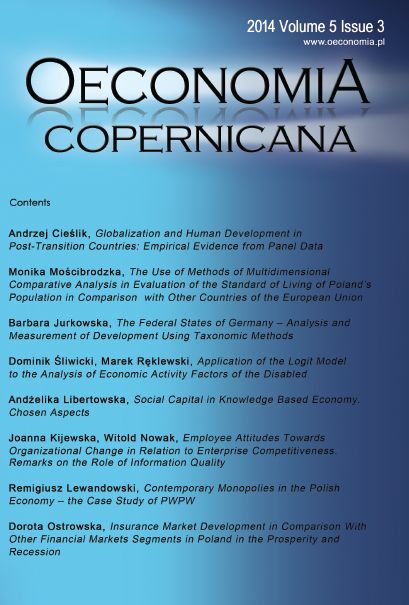Contemporary Monopolies in the Polish Economy ? the Case Study of PWPW
DOI:
https://doi.org/10.12775/OeC.2014.023Keywords:
monopoly, identification security, transactional security, PWPW, key interest of state securityAbstract
The paper presents the role of PWPW, as a company with some attributes of a natural monopoly, in contemporary Polish economy. It shows that commercial companies ? performing special tasks which are necessary for the functioning of state and which concern identification as well as transactional security and at the same time take advantages of the economy of scale and range as a condition of their presence and development ? have a logically justified place in the economy. They are a source of benefits for shareholders in the form of taxes, dividends and other economic benefits, as well as the value of the company itself. Moreover, they are creators of domestic employment and they enrich the national potential of technology. Also, such firms provide a right level of identification and transactional security, which influences the stability and reliability of legal and economic relations. The necessary conditions in order to realize the benefits coming from owning a company such as PWPW by the state are the company?s business continuity, the stability of its domain of action and the financial stability. These conditions can be fulfilled through a certain partnership between the state and PWPW in the form of a legal monopoly or lasting and stable commercial contracts.
Downloads
References
Armentano D.T. (2012), Walka z monopolem czy z konkurencją?, Fijorr Publishing, Warszawa.
Bastiat F. (1850), Harmonies Économiques, http://mises.pl/pliki/upload/harmo nie.pdf.
Baumol W. (1977), On the proper cost tests for natural monopoly in a multiproduct industry, ?American Economic Review?, No. 67.
Boehlke J. (2004), Nadzór korporacyjny w świetle konwergencyjnej teorii interesariuszy a problem koncentracji w gospodarce rynkowej [in:] Dziawgo D. (red.), Indywidualni inwestorzy na rynku finansowym, UMK, Toruń.
Borkowska B. (2009), Regulacja monopolu naturalnego w teorii i praktyce, Wydawnictwo Uniwersytetu Ekonomicznego we Wrocławiu, Wrocław.
Bundesrat (1981), Stenographisches Protokoll der 413 Sitzung.
Dietl M. (2010), Proces monopolizacji i niepewność, Instytut Sobieskiego, Warszawa.
Doll N., Frühbrodt L. (2008), Staat steigt wieder bei Bundesdruckerei ein, http://www.welt.de/wirtschaft/article1767242/Staat-steigt-wieder-bei-Bundesdr uckerei-ein.html.
Dziawgo D. (2006), Relacje inwestorskie ? przyczynek do dyskusji [in:] Mamcarz H. (red.), Rynki finansowe, UMCS, Lublin.
Goc M. (2010), Skuteczność zabezpieczeń polskich dowodów rejestracyjnych, ?Człowiek i Dokumenty?, No. 17.
Holcombe R.G. (1997), A theory of the theory of public goods, ?Review of Austrian Economics?, No. 10.
Iwańczuk A. (2011), Systemy płatnicze i rynek płatności w Unii Europejskiej, CeDeWu, Warszawa.
Jakimowicz A. (2010), Źródła niestabilności struktur rynkowych, PWN, Warszawa.
Lewandowski R. (2004), Makroekonomiczne konsekwencje prania pieniędzy [in:] Adamski A. (ed.), Przestępczość gospodarcza z perspektywy Polski i Unii Europejskiej, TNOiK, Toruń.
Lewandowski R. (2010), Polityka dywidendy w spółkach notowanych na Giełdzie Papierów Wartościowych w Warszawie, unpublished Ph.D. dissertation, UMK, Toruń.
Malthus T.R. (1815), An Inquiry into the Nature and Progress of Rent, and the Principles by which it is regulated, http://socserv2.socsci.mcmaster.ca/ econ/ugcm/3ll3/malthus/rent
Mill J.S. (1965), Zasady ekonomii politycznej i niektóre jej zastosowania do filozofii społecznej, PWN, Warszawa, t. 1.
Ombelli D., Knopjes F. (2008), Documents: the developer?s toolkit, International Organization for Migration, Via Occidentalis Editora Lda.
Ramamurti R. (1987), State-owned enterprises in high technology industries: Studies in India and Brazil, Praeger, New York.
Smith A. (2007), Badania nad naturą i przyczynami bogactwa narodów, Wydawnictwo Naukowe PWN, Warszawa.
Waniowski P. (2003), Strategie cenowe, PWE, Warszawa.
Waterson M. (1987), Recent developments in the theory of natural monopoly, ?Journal of Economic Surveys?, No. 1.






